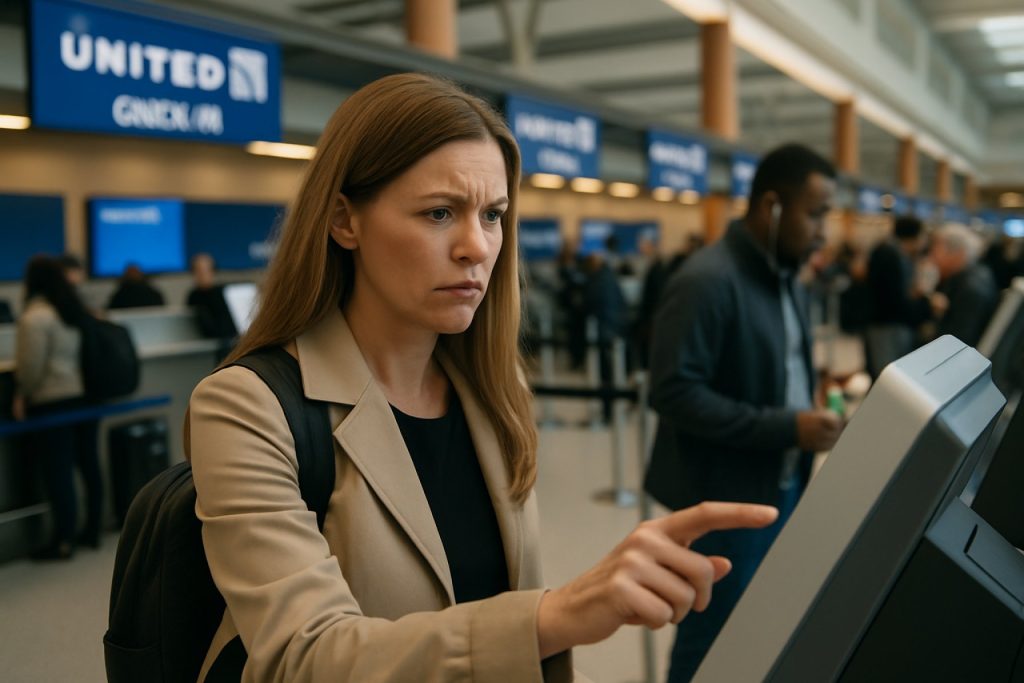
- United Airlines now requires check-in for all domestic flights at least 45 minutes before departure, starting June 3.
- The check-in window shortens from 30 to 45 minutes, aligning with major airlines like Delta and American.
- Missing the new cutoff may result in missed flights, denied boarding, or lost connections, particularly during busy periods.
- This change responds to record post-pandemic travel demand and aims to reduce delays by streamlining processing and boarding.
- Southwest Airlines is introducing basic economy fares and checked bag fees, marking a major policy shift in the industry.
- Travelers should arrive early, factor in possible delays at security, and double-check their airline’s latest check-in requirements.
Long lines snake through bustling terminals as summer travel looms. At the heart of this surge, a wave ripples: United Airlines will tighten its check-in window for all domestic flights, effective June 3. From that day forward, travelers must check in at least 45 minutes before departure—no exceptions for speedy suitcases or tech-savvy mobile boarding passes.
The previous 30-minute margin is shrinking. United now joins the ranks of major carriers like Delta and American, who already enforce a similar 45-minute cutoff, citing industry standards and airport operational constraints. For international wanderers, the familiar 60-minute buffer stands firm.
This shift is not just a tweak in the fine print. Missing the new check-in threshold could upend plans—potentially triggering missed flights, denied boarding, or even lost connections, especially in labyrinthine airports during peak hours. United has made clear: if you arrive too late, their “best effort” to help may not save your reservation.
Why the move? Airline analysts point to an era of packed planes and record airport crowds. Ensuring passengers are processed efficiently means fewer delays on the tarmac and less chaos at crowded gates. The United States slingshots back into post-pandemic travel highs, and with United Airlines seeking to streamline everything from security clearances to baggage loading, the margin for slip-ups narrows.
But United isn’t the only giant rewriting the rulebook. Starting this week, Southwest Airlines—a bastion of free checked bags and transparent fares—plunges into new territory, introducing basic economy tickets and checked bag fees for the first time in its colorful history. This signals a broader industry transformation, where tailored travel options meet tightening rules.
What’s the takeaway? Rushing to catch a flight now poses greater risk to your plans than at any point in recent memory. Allow extra time for traffic jams, security queues, and airport sprawl. The Transportation Security Administration (TSA) underscores this advice, warning that summer’s crush will test even frequent flyers’ patience. Check your airline’s latest departure timing—and don’t leave anything to chance.
Travel’s golden rule this summer: Early is the new on-time.
United Airlines’ New Check-in Deadline: What Travelers Need to Know (And How to Avoid Missing Your Flight)
United Airlines’ tightened check-in window is sending shockwaves through summer travelers. Starting June 3, 2024, check-in for all domestic United flights must be completed 45 minutes before departure—no exceptions for mobile check-ins or speedy baggage. With other industry giants enforcing similar rules and Southwest Airlines rolling out Basic Economy and bag fees, the entire landscape of U.S. air travel is shifting.
Below, we answer the essential questions, compare airline rules, and share actionable travel hacks to keep your summer trips on track.
—
Key Facts and Additional Insights
1. What Does the 45-Minute Cutoff Really Mean?
Even if you check in online or have no bags to check, you must finish check-in (either via mobile, web, or at the kiosk) at least 45 minutes before your flight’s scheduled domestic departure. If you miss this window, United Airlines may cancel your flight reservation, and you risk losing your seat and any connecting itineraries.
2. How Does United Compare to Other U.S. Airlines?
– Delta Air Lines and American Airlines have similar 45-minute domestic check-in cutoffs.
– Southwest Airlines generally requires check-in 30 minutes prior but is tightening options for some fare types.
– For international flights, United and most carriers require check-in at least 60 minutes prior.
(Credible source: United Airlines.)
3. Why the Crackdown?
Airline operations experts, including the International Air Transport Association (IATA), emphasize the need for operational efficiency:
– Passenger volumes in the U.S. are expected to hit all-time highs (IATA, 2024 forecast).
– Delays cascading from late check-ins cost airlines millions in fuel and scheduling disruptions.
– Airlines must now juggle security, baggage, and increased passenger processing times due to explosive summer demand.
4. What Happens If You Miss the Deadline?
If you arrive after the 45-minute check-in cutoff:
– United may cancel your booking and all onward segments.
– Rebooking is subject to fare differences and standby availability.
– In high-traffic airports, missing cutoff times often results in denied boarding with little recourse.
(Consumer Reports: “Arriving early is the best way to protect against missed flights.”)
—
Industry Trends & What’s Changing for Travelers
Basic Economy Expansion:
Southwest Airlines’ jump into Basic Economy and checked bag fees follows the trend set by United, Delta, and American—where “customizable” travel means cheaper base fares, but more fees for seat selection, carry-ons, and priority boarding.
Technology and Automation:
Carriers are increasingly using digital tools to close boarding doors tightly on time. Automated cutoff enforcement is standard.
Traveler Adaptation:
– TSA PreCheck and CLEAR can save time but won’t override airline check-in windows.
– Checked baggage? Bag drop deadlines may be even earlier than ticket check-in cutoffs.
—
Real-World Use Cases & How-To: Avoid Missed Flights
Step-by-Step Tips:
1. Check In ASAP: Use the United app or website as soon as check-in opens (typically 24 hours before departure).
2. Know Bag Drop Times: Bag drop for United often closes 45 minutes prior—beat the rush by arriving 90–120 minutes early, especially on busy travel days.
3. Allow Extra Buffer: Between traffic, airport parking, and security, unforeseen delays add up. Aim to be at the airport 2 hours before domestic and 3 hours before international flights.
4. Set Reminders: Use phone alarms or calendar reminders for check-in and airport arrival times.
5. Check Terminal Maps: Large or unfamiliar airports (Chicago O’Hare, Newark, etc.) require more walking time. Study map layouts in advance.
6. Review Airline Notifications: Opt into alerts from the United app for delays, gate changes, and time-sensitive announcements.
(Source: TSA travel tips.)
—
Pros & Cons
Pros of the New Policy:
– Improved on-time departures and less gate chaos.
– Consistency with industry standards.
– Helps streamline security and boarding processes.
Cons/Limitations:
– Less flexibility for late travelers or those with unpredictable transit times.
– Increased risk of missed flights for families, disabled passengers, or those with checked bags.
– May cause scheduling headaches for connecting itineraries within tight timeframes.
—
Controversies and Security Considerations
– Consumer Backlash: Frequent flyers argue tighter windows punish those hit by factors outside their control (traffic, public transport delays).
– Security Impacts: The move is partially driven by TSA and security needs; bottlenecks in screening necessitate spreading out arrivals.
– Accessibility: Disabled passengers or those needing extra assistance may face more challenges under the new cutoff.
—
Pricing, Features, and Market Impact
– Ancillary revenues from baggage fees and seat assignments across all major airlines are at an all-time high.
– Basic Economy growth now accounts for over 25% of total ticket sales at some carriers (airline industry quarterly reports).
—
Predictions & Trends
– Strict enforcement of cutoff times will likely expand to smaller regional carriers.
– Expect more digital boarding management with real-time alerts—but rules will get even tighter.
– Summer 2024 is set to break passenger records—expect longer lines, so early arrival is non-negotiable.
– The rise of airport biometric systems could, in future years, streamline check-ins further, but for now, cutoffs are king.
—
Quick Answer Section
Q: If I only have a carry-on, do I still need to check in 45 minutes before?
A: Yes, the 45-minute cutoff applies to all travelers on United, regardless of luggage. Check-in must be completed before the deadline.
Q: Will TSA or airport security lines affect check-in times?
A: Airlines enforce check-in cutoffs regardless of TSA lines. Arriving early is essential as security delays are common in summer.
Q: Are other airlines likely to follow United’s lead?
A: Most have already aligned with a 45-minute window, but watch for even stricter rules—and more digital enforcement—industry-wide.
—
Actionable Recommendations
– Arrive Early: Treat 45 minutes as an absolute minimum—aim for 2 hours at the airport before your flight.
– Set Up Alerts: Download your airline’s app and enable all notifications.
– Be Flexible: Book flights earlier in the day to reduce risk from delays.
– Double-Check Policies: Check both your airline’s and departure airport’s rules before traveling.
– Plan Ahead for Summer: Expect longer lines, so budget more time than usual.
For the latest updates and official policies, always check directly with United Airlines or your carrier’s notifications before you fly. And remember, in 2024’s travel climate, early really is the new on-time.
—
Sources for Further Reading:
– [TSA](https://www.tsa.gov) for up-to-date security guidance
– [United Airlines](https://www.united.com) for official policies and apps
– U.S. Department of Transportation Air Travel Consumer Reports



